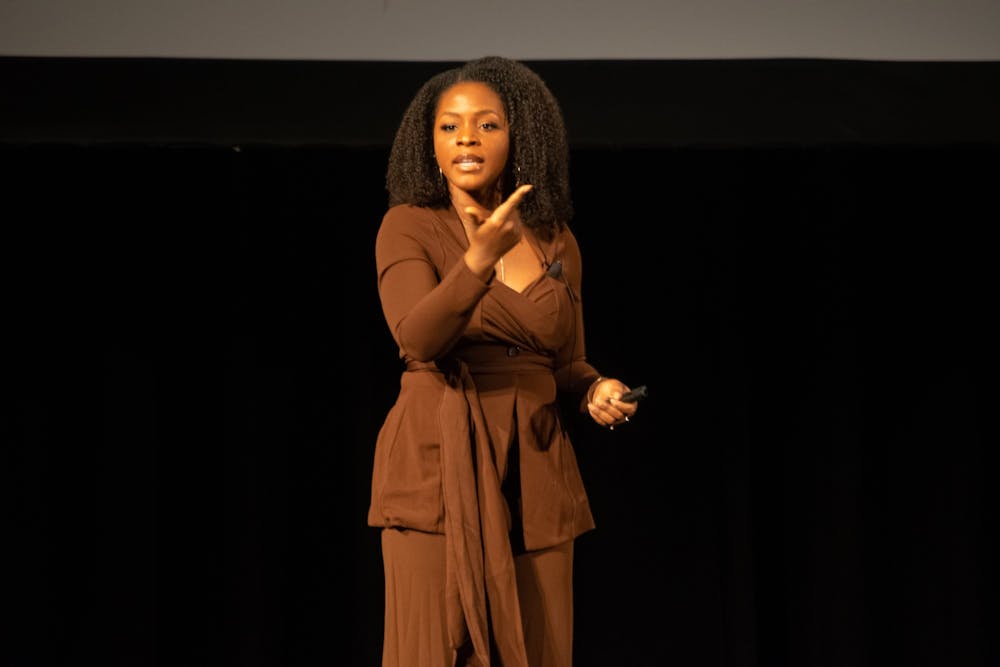‘Every day, people become leaders’ Funmilola Fagbamila, BLM founding member, speaks at CMU

What happens when each of us takes on the responsibility to change ourselves and impact our communities?
This is one of the questions that speaker, activist and playwright Funmilola Fagbamila posed to her audience on March 16 in Plachta Auditorium at Central Michigan University.
Originally intended to be the keynote speech of Black History Month, Fagbamila’s speech was postponed by snow days and spring break. Fagbamila is one of the 17 founding members of Black Lives Matter and recently produced a critically acclaimed play about the diversity within Black communities titled “The Intersection: Woke Black Folk.”
She discussed the political climate in the U.S. as it relates to social media and personal responsibility. Her speech, titled "Everyday Transformations," discussed leaving the world better than we found it.
Personal responsibility
"It is easier to change your thinking than to change the world. Changing your thinking will definitely change the world."
- Sadhguru
Fagbamila said that if she had asked everyone in the audience, which was approximately 100 people, what the most pressing issue is in American politics, there would be a variety of answers. This makes sense, she said, but it means people have a responsibility to advocate for those issues.
“I know so many people whose brilliant idea never comes out of them,” Fagbamila said. “Because they’re not quite sure how people will receive it and they don’t want to seem like they’re trying too hard because we can’t look like we’re struggling, because we’re too ‘fly’ for that.”
She also said that to be successful, you have to have "a cup that runs over," which means nourishing your mind and body by taking in what will benefit you and understanding what your own needs are.
“If you keep your energy nourished, then you have a greater opportunity to keep your energy intact,” Fagbamila said.
She said burnout is a large problem. She said that a lot of activists "lose their fire" because the world beats down on them, and the physical effects are very real.
“When we take what we love to do and use it in service of society, there is no burnout,” Fagbamila said.
She said that after working in activism for about 10 years, people get the impression of her as someone who is never afraid.
“I walk through a lot of fear to continue to push forward and do what I do,” Fagbamila said. “Most of the time my fears do not prove to be real.”
She said that college is a space where a lot of ideas and activism come alive. She said it's important to not assume your ideas are unrealistic.
“Try your best to allow your mind to have that creativity,” Fagbamila said.
Approaching the opposition
"Your wound is probably not your fault, but your healing is your responsibility."
- Denice Frohman
Luke Pramuka is a junior at CMU, and said he was motivated to attend the event after reading Fagbamila’s bio.
He said his biggest takeaway from Fagbamila’s speech was when she talked about approaching the opposition.
“How you approach people who say problematic things,” Pramuka said. “Asking them to support their own claims instead of trying to prove they’re wrong and asking them to explain makes a difference.”
Fagbamila said in her speech that this approach will require more of the responsibility and energy to be placed on the opposition.
“The sign of an evolved mind is to be engaged with various different ideas without shutting down and becoming deeply triggered when somebody says something that you don’t agree with,” Fagbamila said.
She said that she’s been in professional settings where opponents to her message were eager to pick apart her arguments.
“I’ve been very careful to present what I know, rather than what I feel,” Fagbamila said.
Mixed potential of social media
Fagbamila started her speech with an informal audience poll. She asked who likes, dislikes or has a mixed opinion of social media.
The audience had mixed opinions. Fagbamila said social media and the internet allows us to communicate more than ever before and engage with each other more frequently, but that also means we engage more rapidly.
“The way which (we) are now tasked with presenting our ideals and our morals is to grow publicity quickly,” Fagbamila said. “We post the post and engage in it just long enough for the media cycle to do its thing.”
She used the phrase “performative activism” to describe how companies or individuals on social media will promote political issues as they arise, but rarely show a long-term investment.
Fagbamila said there are positives to social media activism as well.
“With the democratizing nature of the internet, people are now being held accountable for things that they – years ago – would have gotten away with," she said. “How we communicate has everything to do with the decisions that we make as it pertains to our political power.”
Maya Allen is a sophomore at CMU, and said she came to hear Fagbamila speak because her friends brought her along from another event on campus earlier in the day.
“It was actually very informative,” Allen said.
She said her biggest takeaway was from what Fagbamila incorporated about social media use and control.
“Sometimes you just have to take a moment instead of getting your emotions out,” Allen said.






